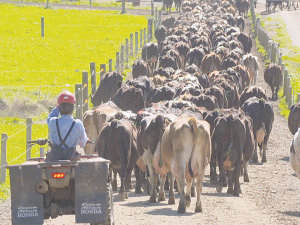Editorial: RMA reforms uproar
OPINION: The euphoria over the Government’s two new bills to replace the broken Resource Management Act is over.
 Waikato Federated Farmers executive Richard Myers says farmers need to follow directors from their processors on sustainability.
Waikato Federated Farmers executive Richard Myers says farmers need to follow directors from their processors on sustainability.
Farmers must follow directives from their processors on sustainability or risk losing markets for their products, says Waikato Federated Farmers executive Richard Myers.
He says dairy farmers are interlinked with their processors and cannot ignore the sustainability targets they set.
Myers was reacting to comments by Canterbury farmer and former Feds dairy chair Willy Leferink (Dairy News November 28th issue), who believes that farmers should be wary that milk processors don’t take over management of dairy farms under the guise of scope 3 emissions target.
Leferink, who has a sharemilker on his 200ha Canterbury farm and supplies Synlait, says if applied correctly, scope 3 targets might deliver some easy wins, like tidying up particularly those farmers who drag the chain on sustainability.
However, he warns that if reducing emissions intensity on farm becomes a box ticking exercise, then it won’t mean anything. Fonterra recently announced that they plan to reduce their on-farm emissions intensity 30% by 2030. It’s a co-op wide target.
But Myers points out that sustainability isn’t a debate about farmers running their own farms.
“Farmers need to understand why we need to reduce our greenhouse gas emission,” he told Dairy News.
“For Fonterra, dairy farmers have been set a target of 30% reduction of GHG emissions by 2030. Farmers must focus on what their customers ask for, when they buy our products, their specifications.
“They pay us our returns for the products we produce. We want to continue to retain our high value customers like Nestle, Mars, Starbucks, Yum Brands.” Myers says banks are now also asking that farmers address these climate issues.
“We have legal and reporting obligations from Government to go down this track and We want to be leaders in sustainability.
“Dairy farmers are interlinked with their processors which means we must listen to their directives: we must be customer led.”
Myers, a Fonterra supplier, says the co-operative board and management are in complete agreement on Scope 3, so it is over to farmers to act.
“It is going to be harder for some farmers than others, so there needs to be support for them.
“Some of the less efficient farmers may drop out but that doesn’t mean we change the objectives. It is important that our leading farmers set the standards and DairyNZ help the others to learn and adopt best practice.”
The Meat Industry Association of New Zealand (MIA) today announced that Chief Executive Officer Sirma Karapeeva has resigned from the role.
The winners of the 2026 Hawke’s Bay/Wairarapa Dairy Industry Awards were announced at the annual awards dinner held at Copthorne Solway Park in Masterton on Thursday evening.
Environment Southland is welcoming this week’s decision by the Environmental Protection Authority (EPA) to approve the release of Blaptea elguetai, a leaf‑feeding beetle that will help control the highly invasive Chilean flame creeper.
This March, the potato industry is proudly celebrating International Women’s Day on 8 March alongside the International Year of the Woman Farmer, recognising the vital role women play across every part of the sector — from paddocks and packhouses to research, leadership, and innovation.
Fruit trader Seeka posted a record profit and returns to shareholders in 2025.
Recent weather events in the Bay of Plenty, Gisborne/Tairawhiti, and Canterbury have been declared a medium-scale adverse event.
OPINION: Staying with politics, with less than nine months to go before the general elections, there’s confusion in the Labour…
OPINION: Winston Peters' tirade against the free trade deal stitched with India may not be all political posturing by the…